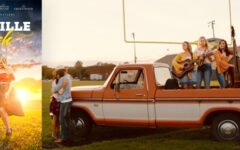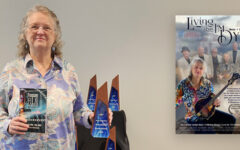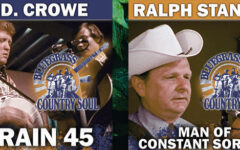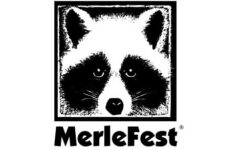 H. Russell Farmer (Russ), had spent the last 30 years producing and directing programming for Kentucky Educational Television (KET), one of the largest public/educational TV networks in the country. Numerous broadcasting awards have come his way, and bluegrass fans are in his debt for producing Jubilee, a KET series which filmed live festival performances in the state of Kentucky. The show has been widely syndicated throughout the public television network, and seen all over the United States over its ten year history.
H. Russell Farmer (Russ), had spent the last 30 years producing and directing programming for Kentucky Educational Television (KET), one of the largest public/educational TV networks in the country. Numerous broadcasting awards have come his way, and bluegrass fans are in his debt for producing Jubilee, a KET series which filmed live festival performances in the state of Kentucky. The show has been widely syndicated throughout the public television network, and seen all over the United States over its ten year history.
Both at the start of his career at KET, and now in his retirement, Farmer’s professional life has been influenced by the music of JD Crowe. He tells this story of a day shortly after he started at KET as an assistant director in 1975.
“One of the television directors at the time called me in my office one morning and asked if I were busy. I wasn’t. He had a group of musicians in the studio who were recording a program for KET’s first annual Tele-Fund. The Floor Director, the person in the studio in control of starting and stopping the action, was having some degree of trouble being heard over the musicians and would I come down and give them a hand. I did.
The band in the studio that day was J.D. Crowe and The New South which featured arguably the best bluegrass pickers that ever were: J.D. Crowe, Tony Rice, Ricky Skaggs, Jerry Douglas and Bobby Slone. All the guys were great that day and I enjoyed very much working with them. We recorded all that day and I had a great time watching and listening between my duties as Floor Director.”
The videotape of that fine performance – with the pompadour hair and the shiny shirts – became an underground treasure, and was available commercially for a time on VHS. For many folks, watching this video is the only chance they’ll ever have to see the groundbreaking band live.
Last fall, just a few years into his retirement from KET, Russ started a conversation with Crowe that has led to plans for him to create a documentary about the life and times of JD Crowe. It will be funded by the KET Independent Production Grant, offered to qualified independent Kentucky film producers who wish to create a project about Kentucky subjects.
When completed, it will be aired on KET-affiliated stations in KY, and hopefully licensed for distribution to other public television properties through the National Educational Telecommunications Association (NETA).
We had the opportunity to conduct a lengthy interview with Russ about this project, here he shared his goals and vision for this film, and how you can help! Please read the whole interview if you are interested in this Crowe documentary.
Q. What led you to pursue this concept for a documentary?
A. I love bluegrass music. During the thirty years I worked for KET, I had the chance to work in the field of music quite a bit. I had co-produced a biography of Kentucky folk artist, Jean Ritchie titled "Mountain Born: The Jean Ritchie Story". It had turned out really well and I had proposed a series of programs at KET which would be titled, "Mountain Born: The _______________Story." KET was never able to fund that proposed series and I guess I carried the idea all those years. After retiring, I was looking for a project to do and since J.D. Crowe was a neighbor and I had become acquainted with him over the years, it was only natural I gravitated toward doing a similar project with him.
Q. Will Crowe be involved in the making of the film.
A. Yes, J.D. was of course the first person I asked about the project. I was sitting at a table at last fall’s J.D. Crowe’s Bluegrass Festival when J.D. came over with a bowl of soup beans, corn bread and a big onion. While he was having dinner I was talking about this project. I finished my spiel about the same time J.D. finished his beans and he said, "I think that would be a good idea.” Since that time we have talked a lot about the project and he is very energetic about it. Last week we had a four hour luncheon at Frisch’s talking about his career, folks I might talk to, and where we might be able to find more video, film and photos of his performances.
Q. Do you have archival footage to use for this project?
A. There is some but not nearly enough. KET video taped J.D. several times through the years starting about 1975 but it is the older stuff that is the hardest to find. The years 1956 ‚Äì 1961 which J.D. spent with Jimmy Martin at the Louisiana Hayride or the Wheeling Jamboree; The early years of The Kentucky Mountain Boys with the Joslin Brothers on fiddle and guitar and Ed Stacey on bass; or the later years of The Kentucky Mountain Boys with Doyle Lawson, Larry Rice and Bobby Slone. While they did television shows during those times, it was either live or the video tapes have been destroyed. For example: Crowe performed for the Dick Cavett show in 1968. That would be a great piece of video tape to have. It took me a week to track down Cavett’s production company, Daphne Productions, only to find out the tape had been destroyed by ABC several years ago.
So yes, I have some video and KET has graciously allowed me to use what they have but I have very little so far in the way of early photos, film, and video or other archival type material.
Q. Will this be a biographical documentary, following Crowe’s career in chronological order?
A. The answer to this question will depend a great deal on how much archival footage I am able to uncover. I suppose the answer is yes. I want the project be a chronological biography and I am producing it in that manner but I also want it to show that J.D. Crowe really is and so, I will be following him around with a camera somewhat like George Goehl did with his program, "Jimmy Martin, the King of Bluegrass.” I also want the program to be musically entertaining so where possible I will be featuring as much of the music as I can. I don’t know that you will see a complete song performed by J.D. and the guys, but we will see several versions of The New South including tunes with Tony Rice singing lead, Keith Whitley singing lead, Glen Lawson singing lead.
If I can get permission to use footage we may even hear a little Flatt & Scruggs, a little Jimmy Martin, a little Mac Wiseman and others who have influenced the music of J.D. Crowe. While informative and a program about the life and times of J.D. Crowe, this program will also definitely entertain.
Q. Will you include interviews with his former band mates?
A. Definitely. One of the good things about producing a program about a living legend is that most of the folks who helped him attain that title are still around. Unfortunately I did not interview Jimmy Martin before he passed away but George Goehl did and I am hopeful there are some words Jimmy left about his praise for J.D.’s banjo playing. I also intend to interview some of Jimmy’s other banjo players. The ones who heard the phrase from Martin "play it like J.D. did.”
Former bass player, Ed Stacey lives here in Lexington as does Bobby Joslin. These were two of the original Kentucky Mountain Boys. Bobby Slone who was with J.D. for 24 years continues to play fiddle as a staff musician at Renfro Valley and lives not far from here. There are all the folks through the years and many have already volunteered to help in anyway they can. Paul Williams has volunteered to help as have Phil Ledbetter, and many other former band mates.
Q. I understand that you are asking the bluegrass community at large to assist you in finding other resources. How can they help?
A. A friend of mine has had some 8mm film in his basement for the past thirty years. He hadn’t thought too much about it until I started asking folks for help. It is a piece of films of J.D. and the Kentucky Mountain Boys at the Holiday Inn from about 1972. I have yet to see the film but I will determine whether it is suitable to use in the project or not.
I really believe there is lots of that type material out there. Someone who was sitting in the audience of the Louisiana Hayride in 1957 might have taken photos of Jimmy and the guys or someone might have caught Jimmy’s performance in 1958 on the Grand Ole Opry without knowing that was the first time J.D. ever appeared on the Opry. A festival in the late 60’s where your father was taking photos and just happened to get a great show of J.D. and the guys rehearsing back stage.
So I believe there is plenty of material out there. Finding it is another matter. It is so difficult to find this sort of material, especially when no one knows you’re looking for it. This and other public requests for documentation in the way of film, audio recordings, video, photos, etc. will serve to let folks know I’m looking.
Q. How can people reach you if they have materials you might want to use?
A. The best way of contacting me is by e-mail. If folks have any information about any archival material whatsoever, whether it is film, photos, video, audio recordings, etc., please let me know.
Thank you very much.







